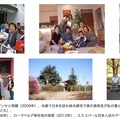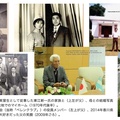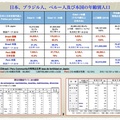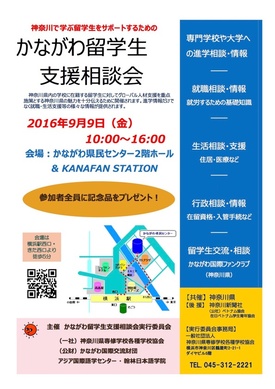
Last September, I received a request from the Kanagawa International Foundation to participate as a lecturer in a seminar for Asian international students, even though I had been training Japanese-descended students from South America. I was surprised, but I was also curious to know more about Asian international students, so I gladly accepted. The project was organized in collaboration with a vocational school, a Japanese language school, and a Vietnam Association in Kanagawa Prefecture, and included presentations on the experiences of senior students, a lecture on legal advice (taught by the author), and a job-hunting corner by related organizations. The training was held twice, in the morning and afternoon, and with the support of the schools they were attending, several hundred international students participated in each session one after another. The training was conducted not only in Japanese, but also in Vietnamese and Nepalese. Many of the international students who participated were currently studying Japanese, or had already completed a Japanese language course and were enrolled in a vocational school, so they had a fairly high level of Japanese comprehension and hoped to find employment in Japan.
According to statistics from the Immigration Bureau of the Ministry of Justice as of the end of December 2015, there are currently 2.2 million foreigners residing in Japan, of which 1.83 million are from Asian countries, and 230,000 are from South America, accounting for over 10%. The number of Asian foreigners residing in Japan has been increasing in recent years, due to a dramatic increase in the number of international students and technical intern trainees, which was different from the past. Looking at the number of foreigners residing in Japan, the top is China with 660,000 people, followed by South Korea with 460,000, the Philippines with 230,000, Vietnam with 150,000, and Nepal with 54,000.
In addition, there are 190,000 people who have obtained visas (resident status) for technical internships and are actually working, of which 85,000 are Chinese, 55,000 are Vietnamese, and 16,000 are Filipinos. These young workers, about 200,000 in total, are working and undergoing training in various fields such as manufacturing and food processing plants, apparel and cleaning, and logistics, and although they are treated as apprentices, they are reported to be working an average of 10 to 12 hours a day. Of course, this is illegal, but the demand for labor due to Japan's labor shortage and the need to send remittances home are contributing to this situation.
Meanwhile, about 240,000 self-financed international students from low-income countries are working the stipulated 28 hours a week to cover their living expenses and tuition fees. Some of them work in black companies (non-existent companies where payment is made only in cash) and receive income from companies that do not report their income, leading to illegal long working hours for international students. Because of necessity, international students end up working in this market, even though they know it is against the law. However, if their illegal employment history is discovered after graduation, they are unable to change their residence status (visa), and there have been reported cases where their path to employment in Japan is cut off.
Recently, more international students can be seen working part-time at convenience stores and restaurants than before. By country, there are 100,000 from China, about 50,000 from Vietnam, and 20,000 from Nepal, but the number from South Korea, which was previously in second place, has decreased to 15,000. The number of people from Central and South America remains around 1,000, half of whom are from Brazil.
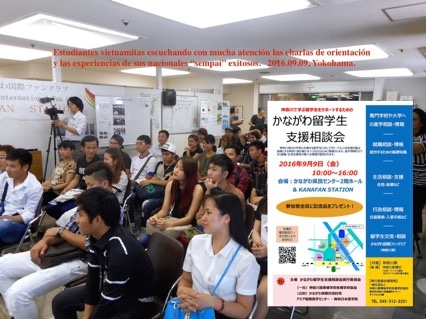
Here, I would like to touch upon Vietnam and Nepal, where many technical intern trainees and international students come to Japan. Vietnam is currently the country with the largest increase in foreign investment in Southeast Asia, and although it is a socialist country, it has adopted a capitalist system economically and its people are highly regarded for being very hardworking. Historically, it has been invaded many times in the midst of conflicts with neighboring countries and great powers, and was even briefly a French colony, but it has never lost a war. Its territory is not much different from Japan's, and its population is 90 million. Its gross domestic product (GDP) is equivalent to 20 trillion yen, the same as Peru's today, but its average annual income per capita is only 2,000 dollars (equivalent to 220,000 yen, one-third of Peru's).
Meanwhile, Nepal, a small country in the Himalayan mountains north of India, is about half the size of Honshu, Japan (140,000 km2) and has a population of 27 million. However, its economy and basic infrastructure are underdeveloped, and illiteracy and infant mortality rates are still high. Its GDP is equivalent to 2.1 trillion yen, and its average annual income per capita is less than 75,000 yen.
Compared to South American countries, the average income in Vietnam is about half that of Paraguay and lower than that of Bolivia. And Nepal is close to that of Haiti, the poorest country. However, Vietnam is growing rapidly and has a lot of potential for the future, and Japanese companies are moving some of their production bases in China to Vietnam. There are already 1,500 Japanese companies operating there, with an annual direct investment of 2 billion dollars (equivalent to 220 billion yen), and 15,000 Japanese people (most of whom are company expatriates) living there. On the other hand, Nepal suffered huge economic losses and 9,000 deaths from the major earthquake that occurred in April 2015, and 20,000 people were forced to live in harsh evacuation conditions in the mountainous areas with poor access even a year and a half later.
The fact that many technical intern trainees and international students are coming to Japan from these two countries coincides well with the needs of industries suffering from labor shortages. It is said that this trend will continue for some time to come. However, one of the future challenges is ensuring that technical intern trainees comply with human rights and labor laws, and related laws have been enacted recently to prevent or more strictly crack down on illegal activities by accepting companies and organizations.
The trainees and international students study Japanese language with all their might, hoping to find employment in Japan after graduation. They work hard, even if it means going to great lengths, to earn as much as possible for the sake of their families and their own futures. However, recent crime statistics show that criminal and violent crimes committed by international students from Vietnam and Nepal have surpassed those committed by Chinese students, and the increase in these crimes over the past few years has become a cause for concern.
In any case, some of them will eventually return to their home countries while others will settle in Japan, making use of their experiences and connections in Japan. Compared to ordinary young people in Japan or Japanese descendants studying abroad on scholarships that do not have to be repaid, international students from Asia have very limited options and life is difficult, but they are very energetic and make efforts to seize these opportunities even at great sacrifices. This attitude is highly appreciated and valued by Japanese companies. These are necessary human resources for Japan's further globalization both domestically and internationally in the future.
Notes:
1. On November 18, 2016, the Foreign Technical Intern Training Program Improvement Act was enacted, which strengthened supervision of accepting organizations and increased penalties and criminal punishment for forcing labor through assault or intimidation.
2. Changes in the balance of power among foreign criminals? Vietnamese criminal offenders surpass Chinese , Sankei Shimbun, November 27, 2016
© 2017 Alberto Matsumoto



